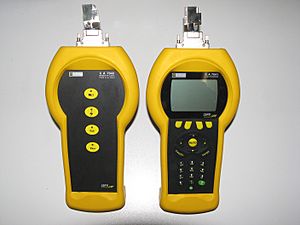Cable tester facts for kids
A cable tester is a cool tool that helps us check if cables are working right. Think of it like a detective for wires! It can find problems like breaks, cracks, or other issues inside a cable. These devices often use tiny electrical signals or sound waves (called echoes) to "see" what's happening inside the wires. They are super important for making sure our internet, TV, and phone connections work perfectly.
Contents
What Does a Cable Tester Do?
Imagine you have a long network cable that connects your computer to the internet. If the internet suddenly stops working, how do you know if the cable is the problem? That's where a cable tester comes in handy! A cable tester checks if the electrical signals can travel all the way through a cable without any interruptions. It can tell you if a wire is broken, if two wires are accidentally touching (a "short circuit"), or if wires are connected in the wrong order.
Why Are Cable Testers Important?
Cable testers are super important for many reasons.
- Setting up Networks: When people set up computer networks in homes, schools, or offices, they use many cables. Testers help make sure every cable is installed correctly and works before anyone tries to use the network.
- Fixing Problems: If your internet goes out or your phone line sounds fuzzy, a cable tester can quickly find out if the cable itself is the cause. This saves a lot of time and effort!
- Safety: In some cases, damaged cables can be dangerous. Testers help identify these problems so they can be fixed safely.
How Do Cable Testers Work?
Most cable testers work by sending a small electrical signal or pulse down one end of a cable. They then "listen" for that signal to come out the other end.
- Finding Breaks: If the signal doesn't come out, it means there's a break somewhere in the cable. Some advanced testers can even tell you how far along the cable the break is!
- Checking Connections: For cables with multiple wires inside, like twisted pair cables used for internet, the tester checks if each wire is connected correctly from one end to the other. It makes sure the right wires are matched up.
- Using Echoes: Some very smart testers use echoes, similar to how bats use sound to navigate. They send a signal and listen for it to bounce back. If it bounces back too soon, it might mean there's a problem or a change in the cable's path.
Types of Cables They Test
Cable testers can be designed to check different kinds of cables:
- Network Cables: These are often Ethernet cables, which are twisted pair wires used for internet and computer networks. Testers for these cables check each of the eight wires inside.
- Phone Cables: Similar to network cables but with fewer wires, phone cable testers ensure clear voice connections.
- Coaxial Cables: These are the cables often used for TV antennas or cable television. Testers check their connection and signal strength.
- Fiber Optic Cables: These special cables use light instead of electricity to send information. Testers for fiber optic cables check if the light can travel through without any issues.
Images for kids
-
A tester and analyzer for twisted pair and fiber optic cables.




